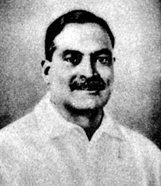Roy, Bidhan Chandra
Roy, Bidhan Chandra (1882-1962) physician, politician. Son of Prakash Chandra Roy and Aghorkamini Devi, Bidhan Chandra Roy was born on 1 July 1882 at Bankipur in Patna. A brilliant student, Roy passed Entrance examination from Patna Collegiate School in 1897 and FA examination from Patna College in 1899. In 1901, after his graduation with Honours in Mathematics Roy joined Calcutta Medical College. He obtained MSS degree from the university of calcutta in 1906 and MRCP and FRCS from England in 1911. On his return to the country he soon earned great fame as a physician.

Inspired by chitta ranjan das, he entered Bengal politics in the early 1920s. In the elections of 1923, he defeated surendranth banerjea in Barrackpur Municipal constituency as an independent candidate. He joined Swarajya Party in 1925 and, on the death of CR Das, became a trustee of the Trust created in memory of the Desbandhu. From this period onward Dr Roy gradually engaged himself in national politics.
He found Mahatma Gandhi as his second Guru (Master). In 1929, he was elected a member of AICC and joined its 44th Lahore session. In the Lahore Congress Jawaharlal Nehru adopted the creed of Purna Swaraj (complete independence) and the young band of Calcutta leadership - subhas bose, sarat bose and BC Roy - supported Nehru.
Roy joined the1930 August session of AICC in Delhi and was imprisoned together with others, as the government declared the session illegal. Being requested by the jail authority, he, while a prisoner, took over the charge of the Alipore Jail Hospital and helped the prisoners. In the 1930s, Roy involved himself in calcutta corporation politics and was twice elected Mayor in 1931 and 1932. Roy condemned the allegation of Charles Tegart that the Corporation was in the control of the Bengalee terrorists and such an attitude brought him closer to the nationalists.
Inspired by Mahatma Gandhi, BC Roy founded the Provincial Anti-Untouchability Forum in Bengal. He also presided over the All India Anti-Untouchability Day convention at the Calcutta Town Hall on 25 June 1932. In 1933-34, Roy worked for the revival of the Swarajya Party with the assistance of Dr Ansari. In this endeavour, he got the consent of Gandhi. The period 1935-1940 was eventful for Roy. Due to disagreement with Sarat Bose, he resigned from the post of President of bengal provincial congress, and for some time he kept himself aloof from politics. However, through the mediation of Gandhi, he rejoined Congress as a member of working committee. He served as the President of Indian Medical Council. He was chosen a Fellow of Calcutta University. After the outbreak of the Second World War, when the AICC changed its policy regarding the boycott of legislative councils, Roy resigned from the working committee. He came to Bengal and was re-elected as an Alderman in Calcutta Corporation.
During the war-period, the Government of India required the assistance of Roy to form the Army Medical Core and getting Gandhi's nod, he took the job in 1942. In the same year, he became the Vice Chancellor of Calcutta University. In 1943, when Gandhi started his fast, Roy voluntarily took the responsibility of supervising the physical condition of the aged leader. Next year, Roy was awarded the honorary 'Doctor of Science' degree by Calcutta University.
In 1946, on the request of the Congress Working Committee Roy led the medical-mission to Malaya for the succour of the disheartened Indians. He also stretched his helping hands to the unfortunate sufferers of calcutta riot.
In independent India, Roy was nominated as the governor of United Province, but he resigned after his medical check-up in USA. In 1948, after the break up of Prafulla Ghosh Ministry in West Bengal, Roy was elected as the leader of the Provincial Congress and had to take the charge of the Government of West Bengal. In 1952, he became the Chief Minister for the second time. After the election of 1957, Roy became the Chief Minister for the third time. At his initiative the Government of India undertook the refugee rehabilitation plan at Dandakaranya. Roy took up projects of new townships at Salt Lake, Kalyani and Durgapur and planned an exciting tourist spot at Digha. He initiated the establishment of Burdwan, Kalyani and North Bengal Universities.
Roy was conferred 'Bharat Ratna' in 1961. He formed the ministry in West Bengal for the fourth time after the 1962 elections, but within a few months breathed his last on 1 July 1962. [Ranjit Roy]
